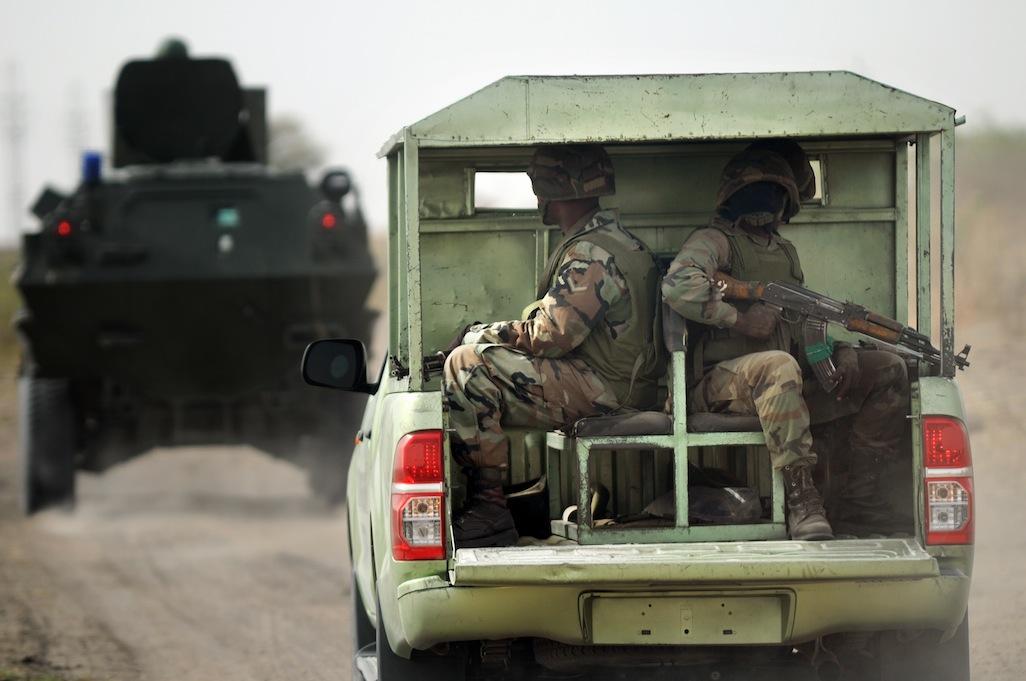Boko Haram suspected in new attacks on Nigerian mosques
Nigerian soldiers patrol in the north of Borno state close to a former Boko Haram camp on June 5, 2013, near Maiduguri.
Nigerian authorities reported this week that at least 56 people were killed in attacks by gunmen on two small towns in the northeast province of Borno, reported Voice of America.
No one has claimed responsibility for the incidents, but leaders suspect the involvement of Boko Haram, the militant Islamist group that has been behind numerous violent attacks since it first declared an uprising against the Nigerian government in 2009.
The larger of the two attacks occurred on Sunday, when gunmen dressed in military uniform entered a mosque in the village of Konduga and killed at least 44 people praying there. There were 26 others wounded in the attack.
On Saturday, gunmen entered the village of Ngom and shot dead 12 people in a separate attack.
The leader of Boko Haram, Abubakar Shekau, released a video on Monday claiming responsibility for previous, similar attacks and urging Nigerians to accept Islamic law and denounce the government.
In another video released July 14th, the leader encouraged the destruction of schools promoting western teachings, saying, "Teachers who teach western education? We will kill them. We will kill them in front of their students, and tell the students to henceforth study the Quran. We are going to burn down the schools, if they are not Islamic religious schools for Allah.”
In the Hausa language, Boko Haram translates to “western education is sin,” and the group's main goal is to impose a strict form of Sharia law, starting with Nigeria.
The Nigerian government has deployed thousands of troops to fight Boko Haram’s militants, though they too have been accused of major human rights abuses. In mid-May, Nigerian president Goodluck Jonathan declared a state of emergency in the northeastern states of Borno, Yabe and Adamawa. The results of the military insurgency against Boko Haram are mixed, as some officials claim the group is beginning to disintegrate, while others believe the violence has only been pushed away to more remote corners of the country.
Shekau shows no interest in a cease-fire, saying, “We will not enter into any agreement with non-believers or the Nigerian government.”
The Nigerian military declared Wednesday that it had killed the second-in-command leader of Boko Haram, Momodu Bama, known by the alias of Abu Saad.
"During the Boko Haram terrorists' attack…on 4 August, 2013 (troops) killed Momodu Bama," a statement from Nigerian spokesman Lieutenant Colonel Sagir Musa said. The Nigerian government has claimed to have killed Boko Haram leaders in the past, and the implications of this most recent declaration remain unclear.
Nigeria is Africa’s largest oil exporter and has a population of about 160 million people. The nation’s oil reserves are located in the mostly wealthy, Christian south, while the mostly Muslim north (where Boko Haram tends to operate) remains in poverty.
While it may be simpler to characterize the divide as purely sectarian, there is more to the violence than a Christian versus Muslim mentality. Boko Haram has been known to attack mosques and other Muslim sites – including the most recent killings – when they suspect that other Muslims are corroborating with the government against them or do not support strict Sharia law.
The violence caused by Boko Haram has already spread to other countries, including neighboring Cameroon. In the video released Monday, Shekau said, "Our strength and firepower is bigger than that of Nigeria. Nigeria is no longer a big deal to us, as far as we are concerned. We will now comfortably confront the United States of America."
The US has declared Shekau a terrorist and placed a $7 million bounty on his head, according to CNN, and has provided some technical and financial assistance to the Nigerian military. However, the international community remains hesitant to get involved in the conflict unless a more pressing threat to international interests arises.
A key partner of the US, Nigeria is considered the political and economic leader of West Africa.
